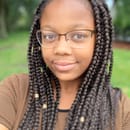Ӧsel Jessica Plante teaches College Writing, Poetic Technique, and Non-Fiction Writing here at FSU. She has earned an M.A. in English with a concentration in Creative Writing, Poetry, from the University of North Texas in 2009 and an M.F.A. from the University of North Carolina Greensboro in 2013. She is also pursuing a Ph.D. in poetry at FSU. She has written many poems that have been published in literary journals that you can view here. Now, she is giving us insight into how her passion for poetry has turned into a thriving career, along with tips on how you can do just the same!
Courtesy: Ӧsel Jessica Plante
Her Campus (HC): What prompted you to begin writing poetry?
Ӧsel Jessica Plante (OJP): I started when I was about fourteen and I remember finishing a poem that was about a couple in love where one of them grows old and the other doesn’t. I remember bringing it downstairs to show my mother, and she was like, “Oh that’s nice,” but I think at that moment I felt like I found something to do. It felt like knowing I had a voice, and it felt like I had a talent for it, and at that point, I decided that I wanted to be a writer when I grew up. I tried to major in it as an undergraduate, but my parents did not want me to do that. My father would say things like, “Who’s gonna pay for your rent and electricity?” because he had no idea that writers could actually make a living. It took me a while to come full circle and come back to it, but I always wrote poetry. I just wrote really bad poetry for many years, until beginning to really study it and read a lot of books. Having the unwillingness not to let a dream go was what has kept me writing.
HC: Is there any advice you can give to prospective writers on getting published?
OJP: Take my classes! I do talk about publishing at some point every semester in my creative writing classes because I feel like it’s really important for undergraduates to know that there is that potential for everybody. It’s not like you have to reach a certain age and then you can start publishing. You can start taking yourself seriously as a writer at any age. I wish that I had met teachers when I was younger who would encourage me that such was possible, so I try to do so for anyone who’s interested and has the fortitude and some talent. There is no one type of writer that’s gonna make it. You just have to decide that’s what you want.
HC: Has teaching shaped your writing?
OJP: Teaching makes me care more about the form of art that I love most, which is poetry. Also, just finding students who really want to invest themselves in becoming a writer is really thrilling for me. I have three students from last semester who are now published in a print literary journal, and they’re all super excited and grateful. I get a lot out of that as a mentor, and it just reaffirms for me that poetry and literature are important and they touch people’s lives. Not only just the people who are writing it, but it’s for the readership out there. You never know what’s going to touch someone else, so I’m always grateful and surprised when I get a random fan or someone messaging me that they enjoy a piece that I wrote. I always can’t believe it, but I’m starting to. I think it is important for me as a writer to realize that I’m touching people’s lives. That sounds kind of hokey, but it’s true.
HC: You have won many awards for your poetry. Which one surprised you the most?
OJP: They all surprised me! I started sending to contests about two years ago just with the hope that something would happen. As happens with most of the publishing world, with poetry and fiction, when you’re starting out there’s a lot of rejection. Whenever I sent something out I kind of in my mind said, “Well that’s the last thing that’s going to happen with it, I’ll probably get my rejection email.” You never know what an editor’s tastes are going to be like and it sometimes feels like you are just putting yourself out there and trusting something might come back to you. The 2018 Meridian Editor’s Prize was the biggest prize I won and I got money for it. I’ve been a finalist in some other contests and you never get paid for those, so to actually get a paycheck was really amazing.
HC: What are you working on now?
OJP: I am working on my first book, and I’m hoping that it gets picked up soon. It’s been a finalist a couple times and I keep monkeying with it and changing the order of poems. The title of the book is called Waveland and it talks about personal experience. About the time I was married and how that didn’t go so well, along with insight into my family and my psychology. Also, I write short fiction pieces and I’m working on an essay right now, so I’m starting to explore nonfiction. I’m working on a memoir about a time I bought a one-way ticket to Costa Rica, took a backpack filled with stuff, my head was shaved and I spent about six weeks backpacking through Central and South America, sort of like on a journey to find myself. The book is about that journey and really rectifying some things that happened in my life that formed my identity but weren’t true to who I was. That journey was me hitting a reset button and getting to start over on a lot of things that maybe had pushed me off my path. Getting back on the path wasn’t easy but it’s definitely worth it, so I want to share that story with people.
HC: Is there anything else our readers should know about you?
OJP: I just came out of my doctoral exam, so I wasn’t really doing this over the summer, but I try to write a little bit every day. It doesn’t matter how good it’s going to be, it’s just important to exercise that muscle every day and to touch the wellspring from where our creativity comes from. As long as you are practicing your craft, you don’t know when you’re going to hit it big and some piece of writing is gonna come out of you that’s just really gonna be mind-blowing or take your writing to the next level. You just have to keep working and that’s something I try to practice.



